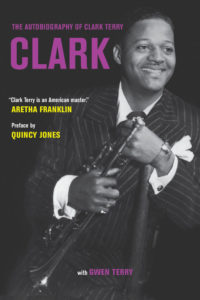.
.
The correct answer is Clark Terry!
.
photo by Brian McMillen
.
Clark Terry’s career spanned the history of jazz music. He played trumpet and flugelhorn for over 70 years, performing in the bands of Charlie Barnet, Count Basie, Duke Ellington, Quincy Jones, and Oscar Peterson, and recorded over 50 albums as a leader. Terry was also an important mentor to, among many others, Miles Davis, Herbie Hancock, and Wynton Marsalis, and was a leading advocate for jazz education.
Click here for Terry’s Wikipedia page
.
___
.
.
From his 2011 book Clark: The Autobiography of Clark Terry, Terry recounts getting hired for a recording gig with Dinah Washington
.
…..In August of ’54 while we were in Los Angeles, Dinah Washington was hanging out of the window of the Adams Hotel when we were getting out of our bus. She was yelling at somebody, then she saw us. She waved at me and said, “Hey, I didn’t know that you were going to be in town! We’ve got a record date to do tonight.”
…..I said, “Who’s on it?”
…..“Maynard Ferguson, Clifford Brown, Max Roach, Richie Powell, Keter Betts, David Schildkraut,” and she kept naming a whole bunch of people.
…..So I said, “And me, too.”
…..She said, “Of course! Just come on and show up.”
…..It was an unusual type of session; I’d never been to one where people were invited to sit in at the studio. Even though I was unadvertised and unexpected, it turned out to be a real fun date. When the album came out, it was titled, Dinah Jams.
…..Everybody called her the Queen. She was definitely on the ball at that recording session, as usual. Really taking care of business. I’d first met her when I joined Hamp’s band, and she was a fabulous lady. Vivacious, lively. A marvelous person. I loved working with her because she was an absolutely incredible singer. Powerful and extremely articulate.
…..I played on almost all of her recordings, even if I had to play under the pseudonym of “Doobie Hicks,” which I used whenever I had to avoid the repercussions of breaking the BMI and ASCAP rules. They were competitive publishing houses that required us to make a signed commitment for one or the other. They didn’t permit us to record with an artist unless it was someone who’d signed with their company.
…..Dinah was notorious for throwing parties. Like a pajama party she had once. The only thing I remember about that party was a picture that someone took of me. On the floor, totally drunk. Like Louis Jordan’s song went, “Sho’ had a wonderful time last night – least wise – they told me I did.”
…..When Dinah got tired of all the people there and she was ready to enjoy her man privately, she said, “All right! Everybody out. The party’s over. We all had fun but it’s time to go home.” She never minced her words. You could bet that whatever she said was exactly what she meant.”
.
– Clark Terry, from his book Clark: The Autobiography of Clark Terry [University of California Press]
.
.
.
Listen to a live 1954 performance of Dinah Washington singing “I’ve Got You Under My Skin,” with trumpet solos by Clark Terry and Maynard Ferguson
.
.
Watch a film of Clark Terry performing on the Tonight Show, c. 1980
.
.
Play another Jazz History Quiz
.
.






























